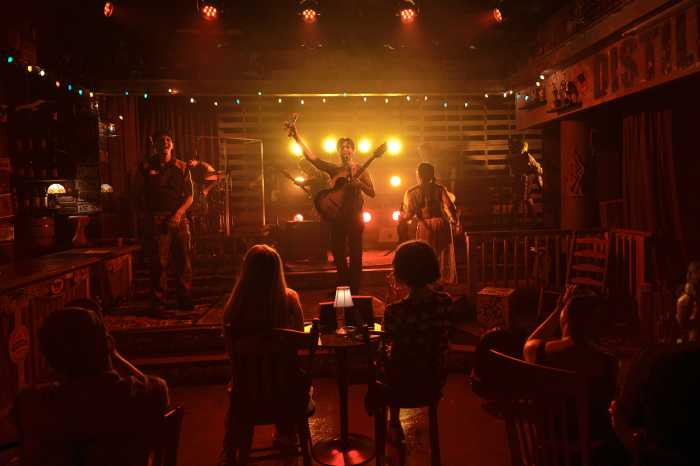Easily the best news of the theater season to date is the just-announced extension of “The Orphan’s Home Cycle” to May 8 at the Signature. Stop reading now, and go order tickets. We’ll wait.
The third and final installment of this brilliant epic has just opened. Called “The Story of a Family,” the three plays in this final series follow Horace Robedaux, now a man with children of his own, through the twists and turns, events and dramas that make up an ordinary life. This is the subtlest of the three parts, and yet it pulses gently, finding lyricism in the quotidian and an almost overwhelming power in the tragedies, or some version of them, that affect every family. The petty grievances, feuds, and judgments that arise in all our homes and the losses we experience in the death of loved ones give these plays their resonance.
The deceptively plain writing establishes Horton Foote as a great American writer, and the production under the direction of Michael Wilson makes this an historic theatrical achievement.
Two deceptively quiet evenings explore the depths of human relationships
The first play, “1918,” is set against the backdrop of the flu epidemic decimating the fictitious town of Harrison, Texas. Horace, now Big Horace to distinguish him from his son, Horace Jr., has his clothing store and his family. As the flu sweeps through town, he struggles with his father-in-law, who wants Big Horace, reluctant to leave his family, to enlist in the Great War. Horace also finds his time increasingly taken up by his brother-in-law, known simply as Brother Vaughn. As Horace enters middle age, he quietly tackles the challenges of managing older and younger generations with only his wife as a support through the storms.
The second play, “Cousins,” is one of the most comic pieces in the cycle. An incisive portrait of family dynamics, it explores what it means to be “kin.” Horace has a brief meeting with Cousin Minnie, a spinster whose life on the margins of the family is heart-wrenching. This play takes on special poignancy because Horace had no family of his own to speak in his youth — other than his weak-willed mother and self-involved sister.
In the final play, “The Death of Papa,” Horace watches as the Vaughn family implodes. Death, as always, heightens family tensions, and Horace struggles to hold his own as he witnesses the misplaced hopes Mother Vaughn places in Brother Vaughn and his brother-in-law’s ultimate undoing. Realizing he will accomplish nothing, Horace reins himself in from confronting his own mother who abandoned him. His restraint is an act of kindness, one that marks Horace finally as a man.
“Don’t be too sure about anything,” Brother Vaughn warns Horace, and yet in each play Horace and his wife Elizabeth say, “I love you.” That’s enough to keep them going, and the only thing in their control.
The cast, in this third part of the cycle, continues to be excellent. Bill Heck gives the performance of the year as Horace. Maggie Lacey, as his wife, shows a nuanced range that consistently impresses. Hallie Foote is outstanding as Mother Vaughn and one of the cousins in the second play. Bryce Pinkham is fine as Brother Vaughn, and Virginia Kull is magnificent in the small roll as Cousin Minnie.
One hates to leave the theater at the end of “The Story of a Family.” It feels as though we’ve come to know these people on an intimate level rarely afforded in literature or theater. You’ve been given an extension. Don’t waste it.
Sam Shepard can always be counted on to chronicle the uneasy relationships between people in an American West that is more popular myth than historic reality. Taciturn stoicism in the face of life-altering tragedy that explodes into usually senseless violence is a recurring narrative in his plays. The identities his characters assume are often at stark odds with their deep need for connection with others, and in this conflict Shepard always locates their essential fragility.
With “Ages of the Moon,” the playwright explores the friendship between two aging men, Byron and Ames. Ames has been thrown out of his house by his adored wife on suspicion of a flirtation he says never happened. Yet the evidence, a scrawled phone number on a scrap of paper, stands against him. Byron, his best friend, has taken a bus across the country to commiserate with Ames at a hunting cabin somewhere in the boonies.
Amid the inevitable, and often highly comic, altercations and rapidly changing dynamics between the two men, we see what passes for a kind of affection and interdependency each man would deny. There is physical and verbal comedy in the situations and stories that unfold, but there is also a deeper more human comedy in the conflict between the men’s longings and limitations. The ultimate irony is that neither can help the other, and they are left waiting to watch a lunar eclipse, almost exactly where they were when they started.
Whether or not it was intended as an American homage to “Waiting for Godot,” that’s how the play comes off. Though its exploration of man’s existence is nowhere near as wide-ranging, philosophical, or profound, this Western Vladimir and Estragon make a comic and heartbreaking a couple.
Stephen Rea and Seán McGinley are outstanding as Ames and Byron, respectively, and Jimmy Fay’s tight, focused direction of the 75-minute piece makes these characters quietly compelling. Shepard’s spare writing is some of his best recent work, perhaps among the finest in his career.
Complete Information:
THE ORPHAN’S HOME CYCLE:
THE STORY OF A FAMILY
Signature Theater
555 W. 42nd St.
In repertory with Parts 1 & 2
Tue.-Fri. at 7 p.m.
Wed., Sat., Sun. at 2 p.m.
$20; signaturetheatre.org
Or 212-244-7259
AGES OF THE MOON
Atlantic Theater Company
336 W. 20th St.
Tue.-Sat. at 8 p.m.;
Sat. 2 at p.m.; Sun. at 3 & 7 p.m.
$65; ticketcentral.com
Or 212-279-4200

































